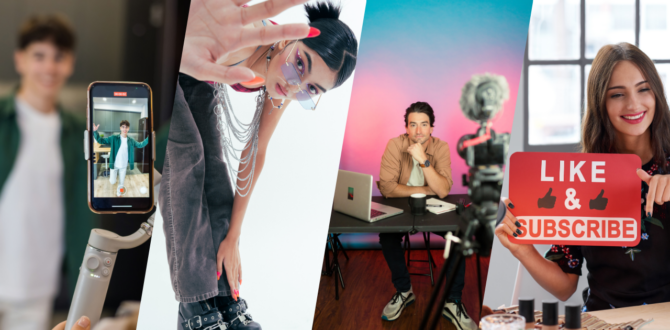Influencers – they are loved or hated. Influencers are a complex and ambivalent group. The influencer profession has grown enormously in popularity in recent years. More and more people dream of becoming a star on platforms such as YouTube, Instagram, TikTok or Pinterest. But what exactly does an influencer do? What types of influencers are there? And how much do they earn? Is it worthwhile as a part-time or even full-time job?
What is an influencer?
The term “influencer” comes from the word “to influence” and refers to people who can influence others in their opinions and purchasing decisions due to their popularity, strong internet presence and high popularity. There are three main types of influencers:
Key Influencer: This group includes bloggers, journalists or brand ambassadors who have built up a large following or readership through their blogs, online magazines or social media profiles. They are often considered experts and enjoy a high level of credibility.
Social Influencer: These influencers are primarily active on social networks such as Facebook, Twitter, YouTube, Instagram and Pinterest. They influence the opinions and purchasing decisions of their followers.
Peer Influencer: This group consists of employees and business partners of companies who influence others based on their experience or expertise.
Which platform is suitable for getting started?
You can get started as an influencer on various platforms, depending on your interests and goals. Here are some popular platforms that are suitable for getting started:
Instagram: Instagram is one of the leading platforms for influencers. With visual content such as photos and short videos, you can build your community and collaborate with brands.
YouTube: If you enjoy creating videos and are targeting a specific niche, YouTube is a fitting choice. You can share tutorials, vlogs, product reviews and more.
TikTok: TikTok is particularly popular with younger audiences. The short, entertaining videos offer plenty of room for creativity and can go viral.
Pinterest: If you specialize in lifestyle, fashion, travel or DIY, Pinterest can be a good platform. Here you can share visual inspiration.
X (Twitter): X is suitable for short, concise messages and discussions. It's ideal for sharing your opinion and networking with other influencers.
LinkedIn: If you work in a professional field, LinkedIn can be a good choice. Here you can share your expertise and make professional contacts.
Facebook: Although Facebook is not as trendy as it used to be, it can still be a platform to build a community and share content.
Remember that each platform has its own rules and target groups. Choose the one that best suits your style and content.
Tips and strategies for content
As an influencer, it's crucial to share high-quality and engaging content to inspire your community and increase your reach. To start your own business as an influencer, there are some important steps and strategies you should consider:
Find your niche: Identify a topic or passion that you are passionate about and can speak to authentically. Whether it's fashion, fitness, travel, beauty or technology - choose a niche that suits you.
Visual content: Use platforms such as Instagram, YouTube and TikTok to share visual content such as photos and videos. Pay attention to aesthetic design and high-quality images.
Storytelling: Tell stories! Share personal experiences, journeys, successes and challenges. Your followers want to get to know you better and identify with you.
Authenticity: Be genuine and transparent. Your community appreciates honesty and authenticity. Avoid content that is too promotional and find a balanced mix between personal posts and collaborations.
Creativity: Experiment with different formats such as reels, IGTV, live streams or stories. Be creative and test out new ideas.
Interaction: Respond to comments, ask questions and encourage your followers to interact. The more you interact with your community, the stronger the bond will be.
Consistency: Share content regularly to keep your followers happy. A good posting schedule helps with this.
Provide value: Think about what added value you can offer your community. Whether it's tips, tutorials, product reviews or entertainment - make sure your content is relevant.
Hashtags and keywords: Use relevant hashtags and keywords to make your posts visible to a wider audience.
Analysis and adaptation: Track the performance of your content. Which posts are well received? Which ones less so? Adjust your strategy accordingly.
Remember that every influencer is individual and there are no set rules. Find your own style and stay authentic – that's the key to success.
Earning potential as an influencer
An influencer with a large reach can easily earn a five-figure salary per month. However, it should not be forgotten that behind the success of most influencers is hard work. Influencers are often self-employed and have no fixed working hours or security.
The amount they earn depends on their reach:
Nano-influencers: 1 to 500 followers
Micro-influencer: 501 to 10,000 followers
Midi-influencer: 10,001 to 100,000 followers
Macro-influencer: 100,001 to 1 million followers
Mega-influencer: Over one million followers
Criticism of influencers
Being an influencer may seem tempting, but it takes commitment, creativity and a smart strategy to succeed in this profession.
Reasons why they are often the subject of so much public criticism:
Success by supposedly simple means: The idea that influencers only communicate their everyday lives and achieve nothing in the process persists. In reality, successful influencers are entrepreneurial, produce content and market their services. Operating high-reach channels is a full-time job – the “influence” is the result.
Evaluating social media work as a job: Many people think that social media work can simply be done on the side. However, professional social media work requires a high level of editorial and production expertise. Influencers are particularly good at this, but their expertise is often underappreciated.
Lack of training and degrees: Influencing is neither an apprenticeship nor a degree subject. Anyone with a cell phone can become an influencer. Nevertheless, most have acquired their skills in related fields. Their content skills are their capital.
Influencers as a private projection screen: Sharing their private lives makes them susceptible to judgments and comparisons - both positive and negative. Some have even given up their jobs due to online hate.
Media competition: Influencers compete with journalists for reach and relevance. The competitive situation could be the reason for critical reporting.
Credit: VTM/Canva



